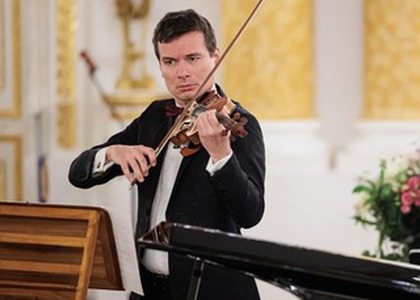> [Archived] Interviews

Interview with violinist Alexandru Tomescu
Starting this year, each Spring will hold a special significance for diplomatic relations between Romania and Poland. On March 3rd, "Romanian-Polish Solidarity Day" will be celebrated. To mark this event and more, violinist Alexandru Tomescu performed a recital at the Royal Castle in Warsaw. We learn more details from the renowned musician.
Mr. Alexandru Tomescu, on Thursday, February 29th, you performed at an event commemorating, for the first time, the celebration of Romanian-Polish Solidarity Day on March 3rd and the announcement of the Romania-Poland cultural season, scheduled from June 2024 to October 2025. First and foremost, what does this bilateral cultural partnership between the two countries mean for our nation?
I believe it is a very good opportunity from a cultural perspective. A few years ago, I participated in several events during the Romania-France cultural season, and we all saw what an extraordinary opening it could bring. I am confident that there are many cultural similarities between Romania and Poland. Cultural exchanges will intensify, not just in music, and this concert at the Royal Palace in Warsaw marked the beginning of this beautiful initiative. In today's world, where so many things seem to divide people more than ever, such acts of friendship, especially at the cultural level between states, nations, and people, are more than welcome.
The recital at the Royal Castle in Warsaw, which you performed alongside pianist Adela Liculescu and soprano Alexandra Zamfira, also marked the celebration of 105 years of diplomatic relations between Romania and Poland. Could you please tell us about the context in which you received the invitation to participate in this event?
The invitation was extended by the Minister of Culture, Mrs. Raluca Turcan. The desire was precisely to musically commemorate this moment, and that's why I chose works representative of Romanian culture, namely compositions by George Enescu, and Polish works. I focused on the composer Henryk Wieniawski, a renowned violinist and virtuoso from the 19th century, to whom I feel a special connection since his Concerto was one of the first performances I played with an orchestra. I was a child, performed in Lublin, his hometown, and won a significant prize at the Wieniawski competition. For me, Wieniawski means a lot as a musician. I would like to emphasize that I am pleased with the organizers' openness to include substantial works in this program, such as George Enescu's Second Sonata. Often, at such official events, there's a preference for programs with smaller pieces. I believe the audience had a very pleasant surprise to discover a romantic and captivating work by George Enescu. Let's not forget that this Second Sonata was composed when he was only 17, and I think it was, as they say, a delightful surprise for many. I'm glad to have had an extraordinary partner in Adela Liculescu, also a laureate of the "George Enescu" competition. It was her first time performing this sonata, and she was in her element. I believe everyone left with a beautiful memory from that evening at the Royal Palace.
Translated by Ramona Ana-Maria Ionescu,
University of Bucharest, Faculty of Foreign Languages and Literatures, MTTLC, year I
Corrected by Silvia Petrescu














